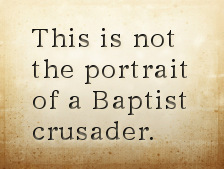Were the Novatians Early Baptists? Novatian's Reversal
(Read the series.)
What did Novatian really think about lapsed apostates? Could they ever be re-admitted to fellowship? Some irresponsible historians have painted a false picture in their writings. One of these men is G.H. Orchard, who wrote:
Novatian, with every considerate person, was disgusted with the hasty admission of such apostates to communion, and with the conduct of many pastors, who were more concerned about numbers than purity of communion.1
To Orchard, Novatian was a pious, principled Baptist—a man who exercised an influence of “an upright example, and moral suasion.”2 The fundamental question is this—is there any circumstance where an apostate may be re-admitted to fellowship in a local church? Is any amount of repentance sufficient? Or, are these believers cut off from fellowship, let alone membership, in a local church? Novatian believed the sin was unforgiveable. J.M. Cramp accurately summed up the issue:
Novatian held that apostacy was a sin which disqualified them from again entering into church fellowship, and to secure a pure community, he formed a separate church, which elected him for its pastor.3



 Read
Read 




Discussion